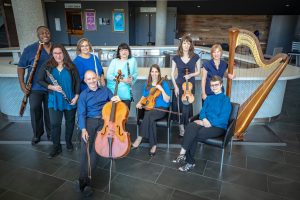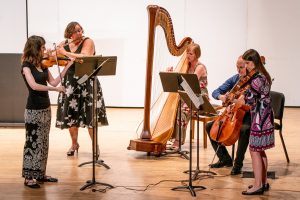TELL ME A STORY: Summerfest makes new friends (but always keeps the old)
Continuity and renewal are key to any arts organization that wants to stick around. Summerfest, now in its 29th season, has remained vigilant on both fronts, with a core of chamber musicians (many of them Kansas City Symphony members), a solid if at times shifting pool of additional colleagues, and a long-term view of artistic leadership. Last summer the crew of Artistic Advisors, which includes veterans Jane Carl (Professor of Clarinet at UMKC Conservatory) and Alexander East (KC Symphony Assistant Principal Cellist), added a lively new partner who said he has “not been around Summerfest that long” but loves being a part of one of KC’s oldest summer institutions.

Not only has Michael (“Mike”) Gordon served as Principal Flutist of the Kansas City Symphony since 2007, he is a prominent figure in the American woodwind community. And he is just as excited as anyone about his second season as Summerfest’s third “Co-Artistic Advisor,” for a series of four programs (July 6th through the 28th) that the group has dubbed “Short Stories and Novelettes.” The Rhode Island native began playing flute at age eight (after a foiled attempt at becoming a kazoo virtuoso) and later earned his Bachelor’s and Master’s degrees at Rice University’s Shepherd School. But he also has plenty of summer experience, at such festivals as Tanglewood, Aspen, and Arizona Musicfest.
Summerfest’s focus on continuity and renewal, according to Mike, applies just as much to the programs as it does to the musicians. “One of the aspects of our ‘programming ethos’ is that we avoid a lot of the warhorses of the chamber-music repertoire,” he said. “Not that there’s anything wrong with them, but it’s just that we’re trying to explore and introduce other things.”
Summerfest has always played milestones of Western music, because audiences love hearing them. This season, for example, includes Prokofiev’s Op. 39 Quintet, Brahms’ Piano Quartet No. 3, Beethoven’s “Ghost” Trio, and Haydn’s D-major String Quartet, (Op 71, No. 2). But lighter and more out-of-the-way compositions, including many by living composers, have always been a part of the group’s core values. “And pointing credit to where it’s due,” Mike said, “Jane and Alex, who have been doing this quite a lot longer than I have, are impressively fluent in all sorts of repertoire that is not considered particularly standard or often-performed.”

For 2019 the team has focused on works (old and new) that “tell stories,” sometimes quite literally. Lembit Beecher’s Stories from My Grandmother tell of a woman who survived both Russian and German occupations of her native Estonia. In Lior Navok’s Six Short Stories for Woodwind Quintet, the five players tell tales to each other, which remain non-specific but are open to each listener’s imagination.
Arnold Bax’s Elegaic Trio is a musical remembrance of actual friends the composer lost during the Irish Rebellion of 1916, and even the Prokofiev Quintet started off as a sort of narrative ballet. The season concludes with Bryce Dessner’s Murder Ballads, which riffs off of the Anglo-American tradition of gruesome ballads recounting “actual” events à la Lizzie Borden.
Music is not always trying to tell narratives, but Summerfest’s focus this year is on works that do. As for works that are not specifically “programmatic” in intent, audience members are welcome to explore their own journeys. And this can be a healthy endeavor, especially for young people.

“That’s how I make music,” Mike said. “Not that I necessarily conceive of a story for everything that I play. But I think that, in some of the interpretative choices that I make, … I have to attach some emotional ‘label,’ in terms of plot or architecture.” (It’s perhaps of no small significance that one of Mike’s favorite composers is Dmitri Shostakovich, whose chamber works and symphonies often contained secret, semi-subversive tunes and “hidden stories” that only 20th-century Soviet audiences could fully grasp.)
In the end one can “enjoy and be moved by music on many levels,” Mike said. “A good piece, whether it has a specific story or not, takes you on a kind of journey. … If we present it well, people will take from the music what is meaningful for them.”
—Paul Horsley
Summerfest includes four concert pairs on Saturdays (at White Recital Hall) and Sundays (at St. Mary’s Episcopal Church) throughout July. For tickets call 816-235-6222, or go to summerfestkc.org.
Week One (July 6-7)
Michael Haydn: Divertimento in C
Giovanni Sollima (the “Jimi Hendrix of the cello,” Mike said): Short Stories
C.P.E. Bach: Trio Sonata, Wq. 145
Sergei Prokofiev: Quintet, Op. 39
Week Two (July 13-14)
Arthur Berger: Quartet for Winds
Lembit Beecher: Stories from my Grandmother
Johannes Brahms: Piano Quartet No. 3 in C minor, Op. 60
Week Three (July 20-21)
Lior Navok: Six Short Stories for Woodwind Quintet
Frank Bridge: Novelletten for String Quartet
Gernot Wolfgang:Three Short Stories
Beethoven’s Piano Trio in D major, Op.70, No.1. (“Ghost”)
Week Four (July 27-28)
Joseph Haydn: String Quartet in D major, Op. 71, No. 2
Arnold Bax: Elegaic Trio
André Jolivet: Pastorales de Noel
Bryce Dessner: Murder Ballads
To reach Paul Horsley, performing arts editor; send an email to paul@kcindependent.com or find him on Facebook or Twitter (@phorsleycritic).





